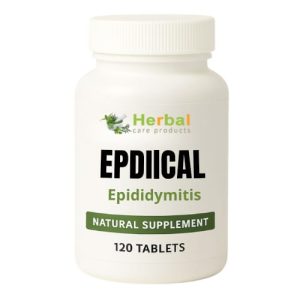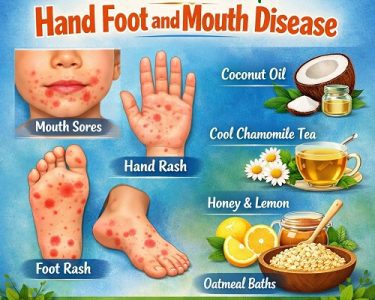Maintaining male reproductive health is essential for overall wellbeing, vitality, and quality of life. While many men focus on fitness and nutrition for muscle strength and energy, reproductive health often receives less attention — until problems arise. From low testosterone and reduced sperm quality to infections such as epididymitis, several factors can influence male fertility and sexual performance. The good news is that nature offers effective solutions. A combination of herbal nutrients, lifestyle changes, and targeted supplements can help support male reproductive function safely and effectively.
Natural ways to support male reproductive health, highlighting herbs and nutrients that also benefit conditions like epididymitis. By making small, consistent adjustments, men can enhance their reproductive system and improve their overall vitality.
Understanding Male Reproductive Health
The male reproductive system is a complex network of organs that includes the testes, epididymis, vas deferens, prostate gland, and penis. Each plays a specific role in producing, storing, and transporting sperm. However, this system is highly sensitive to lifestyle factors such as diet, stress, toxins, and infections.
Key issues that can affect male reproductive health include:
- Low testosterone levels – leading to fatigue, low libido, and poor sperm quality.
- Epididymitis – inflammation of the epididymis, often causing pain and swelling in the testicles.
- Prostate inflammation – contributing to discomfort, urinary issues, and fertility challenges.
- Oxidative stress – damaging sperm DNA and reducing sperm motility.
By addressing these issues through natural support, men can maintain optimal hormonal balance, improve fertility, and protect their reproductive organs from long-term damage.
1. Herbal Support for Male Reproductive Function
Nature provides an abundance of herbs known for enhancing male reproductive health. These botanicals work by improving circulation, supporting hormone production, and reducing inflammation.
Ashwagandha (Withania somnifera)
Ashwagandha is a renowned adaptogenic herb that helps the body manage stress — one of the biggest disruptors of reproductive function. Clinical studies show that ashwagandha may improve sperm count, motility, and testosterone levels. It also supports adrenal health, helping men feel more energetic and resilient.
Tribulus terrestris
Tribulus has long been used in traditional medicine to enhance libido and male performance. Research suggests it may increase luteinising hormone, which stimulates the testes to produce testosterone. Regular use can promote healthy sexual function and stamina.
Ginseng (Panax ginseng)
Often referred to as the “root of life,” ginseng enhances physical endurance, mental clarity, and sexual performance. It supports nitric oxide production, which helps improve blood flow to the genital area. This can enhance erectile function and fertility potential.
Saw Palmetto
Saw palmetto supports prostate health and helps reduce inflammation in the urinary tract. It is particularly useful for men experiencing frequent urination or prostate enlargement, conditions that can affect reproductive wellbeing.
Echinacea and Goldenseal
These herbs are known for their immune-boosting and antimicrobial properties. They can be beneficial in preventing and managing infections of the reproductive tract, including Epididymitis Natural Treatment protocols that rely on natural anti-inflammatory support.
2. Nutrients That Protect and Strengthen Reproductive Health
A diet rich in essential nutrients plays a vital role in maintaining healthy reproductive function. Certain vitamins and minerals are especially beneficial for testosterone production, sperm health, and cellular protection.
Zinc
Zinc is one of the most important minerals for male fertility. It is required for testosterone synthesis, sperm motility, and normal sexual function. A deficiency can lead to low testosterone and poor sperm quality. Foods rich in zinc include pumpkin seeds, oysters, lentils, and whole grains.
Selenium
Selenium helps protect sperm from oxidative damage and supports sperm formation. It is found in Brazil nuts, eggs, and fish. Taking selenium alongside vitamin E enhances its antioxidant effect.
Vitamin D
Adequate vitamin D levels are essential for testosterone production. Sun exposure and foods such as fatty fish, egg yolks, and fortified dairy products can help maintain optimal levels.
Omega-3 Fatty Acids
Omega-3s are vital for sperm membrane health and fluidity. They improve motility and reduce inflammation within the reproductive system. Regular intake of flaxseeds, walnuts, and fish oil supports this balance.
Coenzyme Q10 (CoQ10)
CoQ10 is a powerful antioxidant that enhances sperm energy production and motility. Supplementation has been shown to improve semen parameters in men with fertility challenges.
3. Herbal Remedies for Inflammatory Conditions
Inflammatory conditions such as epididymitis can cause significant pain and may affect sperm transport. Supporting the body’s natural healing processes through herbal and nutritional means can promote faster recovery.
Anti-inflammatory Herbs
Turmeric and ginger are natural anti-inflammatories that reduce swelling and improve circulation. Their bioactive compounds, curcumin and gingerol, support immune function and tissue repair in the reproductive tract.
Antimicrobial Support
Garlic and oregano oil contain potent antimicrobial agents that help combat infections naturally. They can be beneficial additions to dietary plans focusing on Herbal Remedies for Epididymitis and other inflammatory reproductive conditions.
Antioxidant-rich Foods
Berries, green tea, and leafy greens are packed with antioxidants that protect the reproductive tissues from oxidative stress. Including these daily supports healing and long-term testicular health.
4. Lifestyle Habits That Enhance Reproductive Health
Herbs and nutrients provide a strong foundation, but lifestyle habits determine how effectively the reproductive system functions. Small, consistent adjustments can make a significant difference.
Maintain a Balanced Diet
A whole-food diet with plenty of fruits, vegetables, lean proteins, and healthy fats ensures your body receives the nutrients it needs for hormone regulation and sperm health. Reducing processed foods and sugar can further improve energy and reproductive function.
Exercise Regularly
Moderate exercise supports testosterone production, boosts circulation, and reduces stress. However, excessive high-intensity workouts may lower sperm count, so balance is key.
Prioritise Quality Sleep
Sleep is when testosterone production peaks. Aim for 7–8 hours of uninterrupted rest each night to maintain hormonal balance and improve overall health.
Manage Stress
Chronic stress increases cortisol, which can suppress testosterone. Techniques such as meditation, deep breathing, and yoga help calm the mind and promote hormonal equilibrium.
Avoid Environmental Toxins
Exposure to chemicals in plastics, pesticides, and cleaning agents can disrupt hormones and damage sperm. Opt for natural products and filtered water whenever possible.
Maintain a Healthy Weight
Excess body fat increases oestrogen levels, leading to hormonal imbalance. Maintaining a healthy weight through diet and exercise supports normal reproductive function.
5. The Role of Supplements in Male Reproductive Health
While a balanced diet is vital, supplements can provide additional targeted support — especially when nutrient intake from food alone is insufficient. High-quality supplements made from natural ingredients can strengthen the reproductive system, improve energy, and enhance performance.
Herbal and Nutritional Formulations
Formulations combining herbs such as ashwagandha, ginseng, and tribulus with essential nutrients like zinc and selenium provide comprehensive support for male reproductive function. They address both hormonal and cellular aspects of fertility.
Antioxidant Blends
Antioxidant supplements containing vitamins C and E, CoQ10, and green tea extract help neutralise free radicals that damage sperm DNA and testicular tissue.
Adaptogenic Formulas
Adaptogens such as Rhodiola rosea and maca root improve stamina, mood, and sexual vitality. They support the endocrine system and may enhance fertility outcomes.
When choosing supplements, always opt for those made with natural, high-quality ingredients. Many Premium Health Supplements use standardised herbal extracts, ensuring consistent potency and safety for long-term use.
6. Addressing Common Reproductive Concerns Naturally
Male reproductive issues can arise from various causes, including infections, hormonal imbalances, and lifestyle factors. Here are some natural approaches to manage common problems.
Low Testosterone
Focus on zinc, vitamin D, and ashwagandha supplementation. Resistance training, adequate sleep, and reduced stress further support hormonal health.
Poor Sperm Quality
Include antioxidant-rich foods and supplements such as CoQ10 and selenium. Avoid smoking and excessive alcohol, both of which impair sperm production.
Prostate Health
Saw palmetto, pygeum, and pumpkin seeds are excellent for maintaining prostate function. Limiting caffeine and ensuring regular hydration also help.
Epididymitis and Testicular Pain
Anti-inflammatory herbs such as turmeric and ginger, along with rest and hydration, can ease discomfort. Some men find relief with supportive underwear and gentle warm compresses. Integrating Epididymitis Natural Treatment strategies with herbal and nutritional support can reduce recurrence risk and enhance healing.
7. The Importance of Hormonal Balance
Testosterone is central to male reproductive health, but its production depends on the entire endocrine system — including the pituitary and hypothalamus. Hormonal imbalance can manifest as fatigue, low libido, or infertility.
Natural approaches to balance hormones include:
- Ensuring sufficient healthy fats (avocado, olive oil, nuts)
- Reducing sugar and alcohol intake
- Including adaptogenic herbs such as ashwagandha and maca
- Engaging in regular physical activity
- Supporting thyroid health with iodine-rich foods like seaweed
These strategies help the body maintain optimal testosterone levels and reproductive performance.
8. Mind-Body Connection in Male Fertility
Emotional health significantly affects physical wellbeing. Anxiety, depression, and chronic stress can reduce libido and interfere with sperm production. Maintaining a calm, positive mindset can improve reproductive outcomes.
Mind-body techniques to consider:
- Meditation and mindfulness – promote relaxation and mental clarity.
- Yoga – improves circulation and supports hormone balance.
- Counselling – can help address relationship or performance-related stress.
By nurturing both mind and body, men can support not just their reproductive health but their overall sense of vitality and confidence.
9. Supporting Long-Term Reproductive Vitality
Consistency is key to maintaining reproductive health. Natural remedies and lifestyle changes require time and commitment, but their benefits extend beyond fertility — improving heart health, energy levels, and longevity.
Practical long-term tips include:
- Scheduling regular health check-ups
- Maintaining a nutrient-rich diet
- Using natural supplements to fill nutritional gaps
- Avoiding smoking and excessive alcohol
- Staying physically and mentally active
These habits lay the foundation for sustained reproductive strength and wellbeing.
10. When to Seek Professional Advice
While natural methods can be highly effective, persistent or severe symptoms warrant medical evaluation. Men experiencing ongoing pain, swelling, or fertility challenges should consult a healthcare provider. A combination of conventional assessment and natural interventions often provides the best outcomes.
For chronic inflammation or infections, a healthcare professional can help determine whether antibiotics are necessary, while herbal and nutritional therapies can be used to support recovery and prevent recurrence.
Conclusion
Supporting male reproductive health naturally is both achievable and rewarding. By combining herbal remedies, nutrient-dense foods, and balanced lifestyle choices, men can enhance fertility, hormone balance, and overall wellbeing. Herbs such as ashwagandha, tribulus, and ginseng, along with essential nutrients like zinc and selenium, form a strong foundation for vitality and reproductive strength.
For men managing inflammation or infections, incorporating Herbal Remedies for Epididymitis into daily routines can provide gentle yet effective support. Quality Premium Health Supplements can further strengthen the body’s natural defences and promote long-term reproductive wellness.
Through consistent self-care, men can take control of their reproductive health — improving not only their fertility but also their confidence, energy, and quality of life.





